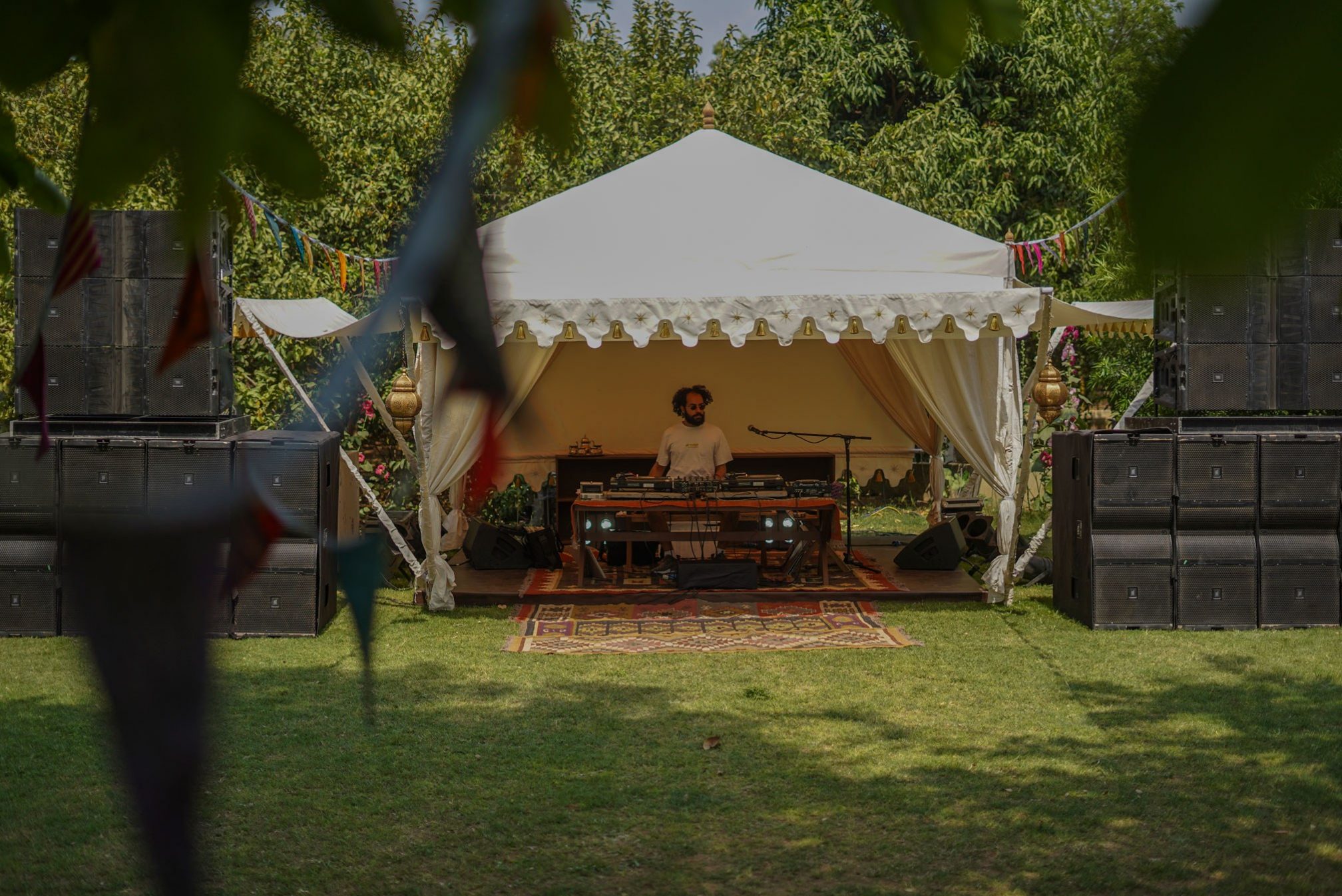 Features
Features
Review: Nomads sets the blueprint for intimate "new normal" festivals
Simar Deol attends Nomads in India, the offshoot festival thrown by the crew behind Magnetic Fields
After a year that seemed sans end, I found myself entering the asynchronous and seemingly unreal world of a music festival in the middle of March. Nomads, the newest iteration of Magnetic Fields, was taking place in Ranthambore, India, nearly a year after lockdown was first enforced. Even with hefty COVID-safety regulations in place, it felt unnaturally optimistic to walk into a space full of thumping bass, free-flowing beer and ecstatic ravers.
Such hesitations quickly vanished on entering the festival site, which was the stunning Nahargarh palace. Located only a few kilometres away from Ranthambore National Park, the expansive palace overlooked ancient rock formations and out into the Rajasthani desert — made only more scenic by the blazing orange and red sunsets. With accommodation on site being mandatory, and the festival being limited to 400 people, the insulated space was deemed COVID-safe once every visitor’s RT-PCR test was verified. Leaving and re-entering was not permitted, and every staff member including artists, food vendors and bartenders also had to produce their negative tests.
Read this next: Dancefloors in India are bringing people together
Nomads was created knowing very well this would not, and could not, be like any regular festival. Keeping in mind COVID protocols, a specific emphasis was placed on creating experiences off the dancefloor. Morning kundalini yoga and energy readings curated by Vitality Hours at the Magnetic Sanctuary were complimented by sit down meals offered at The Chef’s Table. Morning safari’s allowed guests to take a punt at tiger-spotting in the nearby national park. Alternatively, lounging by — or preferably in — the pool while DJs spun house and disco nearby was a fail-proof plan. Pop-up cocktail bars seemed to appear when festival-goers needed a pick-me-up the most and the (underrated) Lazy Picnic stage had Zag Erlat and DJ MoCity (pictured) spinning a variety of eclectic and groovy tunes for those who just wanted to relax under the trees. Meandering aimlessly between sets through palatial courtyards only to discover little nooks and corners — that you knew you would return to later that night — was an enjoyable activity in its own right.
With five stages on offer, the evenings were naturally dominated by music. The tree-lined sundowner Bageechi stage — arguably the best of the lot — saw a host of Indian talent including Kohra and Unnayanna. A genre disregarding and exciting set from Girls Night Out, that included the crowd pleasing mandarin remix of 'Yeke Yeke', not only secured him as a crowd favourite, but also set the tone for this picturesque stage with dancers mimicking his energy. Sindhi Curry followed up later that weekend with enjoyable classic house tunes, but unfortunate scheduling meant it was sadly missed by most. Inside the peacock club, a crowd for Lifafa evidenced his popularity, with practically everyone singing along to hits from his album 'Jaago'. Peter Cat Recording Co. and Begum were also favourites, but it was the Bangalore-based, Nepali band, Gauley Bhai who were the real showstoppers—stealing everyone’s heart with their discordant but electrifying stage presence. Inside the Den, a darker room inspired by the arid jungle of Ranthambore, an unexpected B2B from Chhabb and Shireen, that closed Saturday night, had the whole room vibrating. All hesitations of partying for the first time since the pandemic were viscerally released with roughly four hours of dirty techno. Sunday, the closing night, saw a somewhat chaotic, but nonetheless enjoyable, B2B from SpaceJam, MoCity and Chhabb, ending the festival (and hopefully this past year) on a much needed high note.
Read this next: Magnetic Fields is India's glorious boutique festival
Attending a festival felt a little nerve-wracking. Even with Nomads abiding by all local safety regulations, a slight air of nervousness was palpable, not just in the guests, but in the artists too. In moments it felt as though nothing had changed in the past year, as though coming to a music festival to share beers and cigarettes was a totally normal act. Other times, it was apparent, like when people chose to stand just far away enough to make it COVID friendly, but also socially awkward. Fist bumps replaced hugs and there were fewer instances of people showing random acts of affection — probably a result of people choosing to not break their chosen COVID-safe circles. Some appeared totally unaffected, canon-balling into the pool or hopping around the dancefloor. Despite masks being mandatory in all indoor stages, it felt difficult, or rather uncool, to enforce. As with everything in this COVID era, a certain sense of individual responsibility came to define the festival; deciding when there were too many people in the pool, or not enough dancers wearing masks or —most heartbreakingly — refusing to share your water bottle.
Accepting this new reality was made less challenging by those little festival moments that convinced guests to attend a festival at all right now. Looking around the room to see it filled with happy ravers or watching DJs throw out bangers from behind the booth made all COVID related protocols seem like a minor inconvenience. A general attitude of feeling grateful to be in a beautiful space, with good music and close mates enveloped the last night of the festival, as groups lounged around, sipping the last of their beer.
Simar Deol is a freelance journalist. Follow her on Twitter
Read this next: Meet Krunk Kulture. Mumbai's bass music record label


